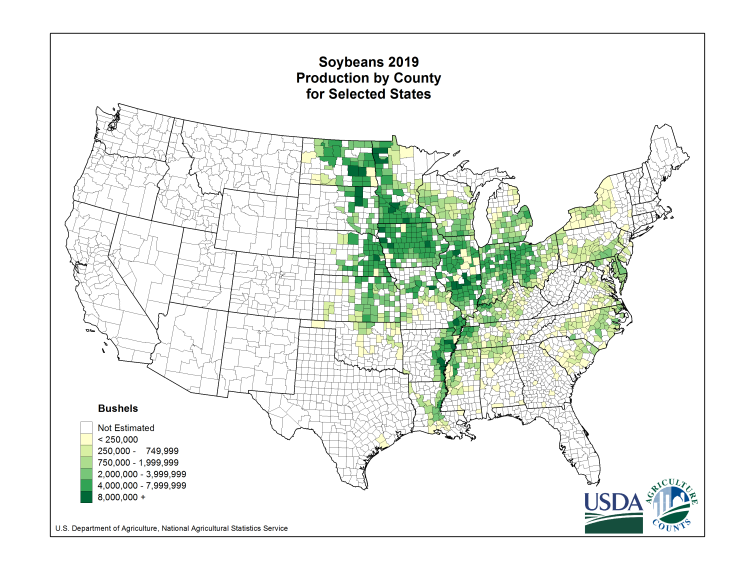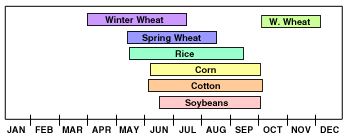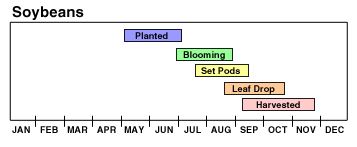Soybeans
The soybean or soya bean is a species of legume native to East Asia, widely grown for its edible bean, which has numerous uses.
Soybean futures and options are an easy, liquid tool for speculating or hedging against price movements for one of the world’s most widely grown crops. Benefit from the liquidity of an average of over 200,000 contracts traded per day and peaks in open interest near 900,000.
Soybean Futures

National Crop Progress – Timetable


Soybean Contract Specification
| Name | Symbol | Exchange | Size | Month | Tick | Unit Move $ |
| Soybean | ZS | CBOT | 5000 bushels | F,H,K,N,Q,U,X | 0.0025/$12.5 | 50 |
Monthly Symbol
| Jan | Feb | Mar | Apr | May | Jun | Jul | Aug | Sep | Oct | Nov | Dec |
| F | G | H | J | K | M | N | Q | U | V | X | Z |
Export Sales
Weekly Historical Data
From USDA: United States Department of Agriculture
The following historical charts covering selected agricultural commodities starting from calendar year 1990 through the current week’s date reflecting weekly exports, accumulated exports, net sales, and outstanding sales for the current marketing year and net sales and outstanding sales for next marketing year are available
Weekly Export UPDATED
Soybean Future Price
USDEU
Social Sentiment
Sentiment Score
Social Sentiment Trend
Coming Soon
Meteo
Long-term interest ratesTotal, % per annum, Jan 2007 – Mar 2021

Report USDA: Prospecting Plantings
This report contains the expected plantings and last year’s harvest for principal crops and tobacco presented on a state basis. Principal crops are as follows: corn, all wheat, winter wheat, durum wheat, other spring wheat, oats, barley, flaxseed, cotton, rice, all sorghum, sweet potatoes, dry edible beans, soybeans, sunflower, peanuts, sugarbeets, canola, and proso millet.
Wasde Report
The World Agricultural Supply and Demand Estimates (WASDE) is prepared and released by the World Agricultural Outlook Board (WAOB). The report is released monthly, and provides annual forecasts for supply and use of U.S. and world wheat, rice, coarse grains, oilseeds, and cotton. The report also covers U.S. supply and use of sugar, meat, poultry eggs and milk, as well as Mexico’s supply and use of sugar. The WAOB chairs the Interagency Commodity Estimates Committees (ICECs), which include analysts from key USDA agencies who compile and interpret information from USDA and other domestic and foreign sources to produce the report. For more information about the WASDE process and data, visit the WASDE FAQs page.
DISCLAIMER:
The above information was drawn from sources believed to be reliable. Although it is believed that information provided is accurate, no guarantee is made. Thinksmart assumes no responsibility for any errors or omissions.
